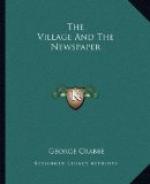Of man; and silent sinks into the grave.
But ere his death some pious doubts arise,
Some simple fears, which “bold bad” men despise;
Fain would he ask the parish priest to prove
His title certain to the joys above:
For this he sends the murmuring nurse, who calls
The holy stranger to these dismal walls:
And doth not he, the pious man, appear,
He, “passing rich, with forty pounds a year?”
Ah!no; a shepherd of a different stock,
And far unlike him, feeds this little flock:
A jovial youth, who thinks his Sunday’s task
As much as God or man can fairly ask;
The rest he gives to loves and labours light,
To fields the morning, and to feasts the night;
None better skill’d the noisy pack to guide,
To urge their chase, to cheer them or to chide;
A sportsman keen, he shoots through half the day,
And, skill’d at whist, devotes the night to play:
Then, while such honours bloom around his head,
Shall he sit sadly by the sick man’s bed,
To raise the hope he feels not, or with zeal
To combat fears that e’en the pious, feel?
Now once again the gloomy scene explore,
Less gloomy now; the bitter hour is o’er,
The man of many sorrows sighs no more. —
Up yonder hill, behold how sadly slow
The bier moves winding from the vale below:
There lie the happy dead, from trouble free,
And the glad parish pays the frugal fee:
No more, O Death! thy victim starts to hear
Churchwarden stern, or kingly overseer;
No more the farmer claims his humble bow,
Thou art his lord, the best of tyrants thou!
Now to the church behold the mourners come,
Sedately torpid and devoutly dumb;
The village children now their games suspend,
To see the bier that bears their ancient friend:
For he was one in all their idle sport,
And like a monarch ruled their little court;
The pliant bow he form’d, the flying ball,
The bat, the wicket, were his labours all;
Him now they follow to his grave, and stand,
Silent and sad, and gazing hand in hand;
While bending low, their eager eyes explore
The mingled relics of the parish poor.
The bell tolls late, the moping owl flies round,
Fear marks the flight and magnifies the sound;
The busy priest, detain’d by weightier care,
Defers his duty till the day of prayer;
And, waiting long, the crowd retire distrest,
To think a poor man’s bones should lie unblest.
But ere his death some pious doubts arise,
Some simple fears, which “bold bad” men despise;
Fain would he ask the parish priest to prove
His title certain to the joys above:
For this he sends the murmuring nurse, who calls
The holy stranger to these dismal walls:
And doth not he, the pious man, appear,
He, “passing rich, with forty pounds a year?”
Ah!no; a shepherd of a different stock,
And far unlike him, feeds this little flock:
A jovial youth, who thinks his Sunday’s task
As much as God or man can fairly ask;
The rest he gives to loves and labours light,
To fields the morning, and to feasts the night;
None better skill’d the noisy pack to guide,
To urge their chase, to cheer them or to chide;
A sportsman keen, he shoots through half the day,
And, skill’d at whist, devotes the night to play:
Then, while such honours bloom around his head,
Shall he sit sadly by the sick man’s bed,
To raise the hope he feels not, or with zeal
To combat fears that e’en the pious, feel?
Now once again the gloomy scene explore,
Less gloomy now; the bitter hour is o’er,
The man of many sorrows sighs no more. —
Up yonder hill, behold how sadly slow
The bier moves winding from the vale below:
There lie the happy dead, from trouble free,
And the glad parish pays the frugal fee:
No more, O Death! thy victim starts to hear
Churchwarden stern, or kingly overseer;
No more the farmer claims his humble bow,
Thou art his lord, the best of tyrants thou!
Now to the church behold the mourners come,
Sedately torpid and devoutly dumb;
The village children now their games suspend,
To see the bier that bears their ancient friend:
For he was one in all their idle sport,
And like a monarch ruled their little court;
The pliant bow he form’d, the flying ball,
The bat, the wicket, were his labours all;
Him now they follow to his grave, and stand,
Silent and sad, and gazing hand in hand;
While bending low, their eager eyes explore
The mingled relics of the parish poor.
The bell tolls late, the moping owl flies round,
Fear marks the flight and magnifies the sound;
The busy priest, detain’d by weightier care,
Defers his duty till the day of prayer;
And, waiting long, the crowd retire distrest,
To think a poor man’s bones should lie unblest.
BOOK II—THE ARGUMENT.
There are found, amid the Evils of a laborious Life, some Views of Tranquillity and Happiness—The Repose and Pleasure of a Summer Sabbath: interrupted by Intoxication and Dispute—Village Detraction—Complaints of the ’Squire—The Evening Riots—Justice— Reasons for this unpleasant View of Rustic Life: the Effect it should have upon the Lower Classes; and the Higher—These last have their peculiar Distresses: Exemplified in the Life and heroic Death of Lord Robert Manners—Concluding Address to His Grace the Duke of Rutland.




